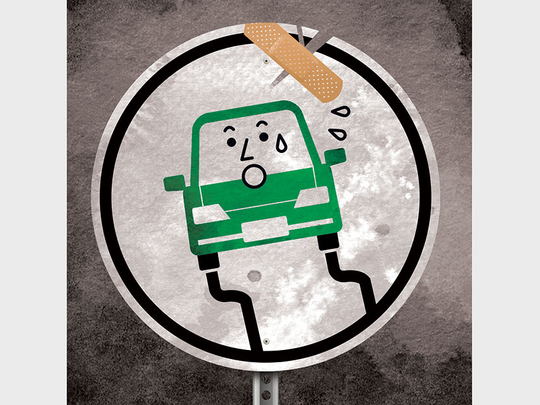
In several Gulf Cooperation Council countries, driving is an issue and it is not related to women not being allowed to drive in Saudi Arabia. It is regarding the abnormally large number of deaths and injuries suffered by motorists and pedestrians on highways and city roads — most as a result of failure to follow the rules. Authorities in some countries have realised the seriousness of this problem and taken aggressive measures to deal with it.
Road traffic deaths and injuries cause considerable emotional and economic pain to all those who are affected and to the nation as a whole. Apart from those killed, there are the additional trauma of expenses of treatment, which include rehabilitation, as well as reduced or lost productivity.
The May 2016 figures released by World Health Organisation state:
n About 1.25 million people die each year as a result of road traffic crashes.
n Road traffic injuries are the leading cause of death among young people, aged 15–29 years.
n 90 per cent of the world’s fatalities on roads occur in low and middle-income countries, even though these countries have approximately half the world’s vehicles.
n Half of those dying on the world’s roads are “vulnerable road users”: Pedestrians, cyclists and motorcyclists.
n Without action, road traffic crashes are predicted to rise to become the seventh leading cause of death by 2030.
n The newly-adopted 2030 Agenda for Sustainable Development has set an ambitious road-safety target of reducing the global number of deaths and injuries from road traffic crashes by half by 2020.
In Dubai, for example, authorities had initiated a campaign that resulted in imposing fines on 34,756 motorists in the third quarter of this year, compared to 31,904 in the same period last year. Apart from that, jaywalkers, who contribute to a significant share of traffic accidents, have been actively intercepted and fines have been issued to 15,818 violators this year, as opposed to 15,105 last year.
In Kuwait last month, an extensive traffic awareness campaign covering most governorates of the country resulted in the arrest of 417 violators, issuance of 776 traffic citations and confiscation of 51 vehicles — including 13 wanted vehicles.
Saudi Arabia, by virtue of its large population, has a significantly higher rates of traffic-related incidents. However, it is not clear whether this is because of the sheer number of motorists on a large network of roads and highways or the lack of enough traffic patrolling. What is beyond doubt is that every year in Saudi Arabia, approximately 7,000 lives are cut short as a result of a traffic accidents. Some 39,000 more people suffer non-fatal injuries, with many incurring disabilities as a result of their injuries, according to an official of the Traffic Safety Committee, who added that the figure of 29 deaths per 100,000 motorists puts Saudi Arabia high on the list globally. The volume of economic losses resulting from traffic accidents stands at a staggering 3 billion Saudi riyal (Dh2.93 billion) annually.
In August this year, the Saudi Council of Ministers amended a number of articles of the Traffic Laws. Current legal provisions guarantee the protection of the rights of vehicle owners, provide enhanced traffic safety and safeguards of lives and properties from violators. The Director of the Traffic Department has urged all people to strictly abide by the rules and regulations and has warned that the authorities “will not show any leniency in implementing new regulations, especially Article 69, pertaining to drifting/stunt driving”.
Paying penance for breaking these laws is well and good in the interest of public safety. But there are robust laws in Saudi Arabia already, pertaining to just about everything that a motorist may encounter when on the road. And I do not believe that there are too many aspects of safe-driving that have not already been covered by existing Saudi traffic laws. Yet, such warnings often fall on deaf ears.
What Saudi Arabia lacks is proper application of traffic laws. Put simply, law-breakers have been emboldened by lack of punishment and that has further contributed to a rampant flouting of rules on a daily basis on Saudi roads. The lack of visible means to arrest this trend is all too evident. From speeding to dangerous driving to discarding litter out of the windows of vehicles, many motorists in Saudi Arabia have no fear of the law. The speed-monitoring cameras installed at various junctions cannot be expected to be an enforcer and some enterprising drivers have even found means to evade these cameras while speeding.
To address the situation effectively, tough measures are required. Otherwise, no amount of laws passed by the government will help make life safe on the roads. Stationing police patrol vehicles at busy intersections or on highways will not deter offenders. The laws on safer-driving will be of little use unless the traffic department implements them forcefully.
Tariq A. Al Maeena is a Saudi socio-political commentator. He lives in Jeddah, Saudi Arabia. You can follow him on Twitter at www.twitter.com/@talmaeena.











